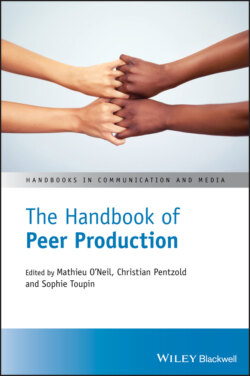Читать книгу The Handbook of Peer Production - Группа авторов - Страница 103
References
Оглавление1 Bauwens, M. (2005). The political economy of peer production. CTheory, December 1. ctheory.net/articles.aspx?id=499.
2 Becker, H. S. (1984). Art worlds. Berkeley, CA: University of California Press.
3 Benkler, Y. (2002). Coase’s Penguin, or, Linux and the nature of the firm. Yale Law Journal, 112(3), 367–445.
4 Benson, R., & Neveu, E. (Eds.). (2005). Bourdieu and the journalistic field. Cambridge: Polity.
5 Bohlman, P. V. (1988). The study of folk music in the modern world. Bloomington, IN: Indiana University Press.
6 Boltanski, L., & Chiapello, E. (2005). The new spirit of capitalism. International Journal of Politics, Culture, and Society, 18(3), 161–188.
7 Boltanski, L., & Thévenot, L. (2006). On justification: Economies of worth ( C. Porter, Trans.). Princeton, NJ: Princeton University Press.
8 Bourdieu, P. (1993). The field of cultural production ( R. Johnson, ed., 1st ed.). New York, NY: Columbia University Press.
9 Coleman, E. G. (2013). Coding freedom: The ethics and aesthetics of hacking. Princeton, NJ: Princeton University Press.
10 Currie, M., Kelty, C., & Murillo, L. F. R. (2013). Free software trajectories: From organized publics to formal social enterprises? Journal of Peer Production, 3. Retrieved from http://peerproduction.net/issues/issue‐3‐free‐software‐epistemics/peer‐reviewed‐papers/free‐software‐trajectories‐from‐organized‐publics‐to‐formal‐social‐enterprises/
11 Dafermos, G. (2012). Authority in peer production: The emergence of governance in the FreeBSD project. Journal of Peer Production, 1(1). Retrieved from http://peerproduction/issues/issue‐1/peer‐reviewed‐papers/authority‐in‐peer‐production/
12 Deuze, M. (2005a). Popular journalism and professional ideology: Tabloid reporters and editors speak out. Media, Culture & Society, 27(6), 861–882. https://doi.org/10.1177/0163443705057674
13 Deuze, M. (2005b). What is journalism? Professional identity and ideology of journalists reconsidered. Journalism, 6(4), 442–464. https://doi.org/10.1177/1464884905056815
14 English‐Lueck, J. A. (2002). Cultures@SiliconValley. Stanford, CA: Stanford University Press. http://www.sup.org/books/title/?id=3738
15 Finley, K. (2018, September 26). The woman bringing civility to open source projects. Wired. Retrieved from www.wired.com/story/woman‐bringing‐civility‐to‐open‐source‐projects/
16 Ford, H., & Wajcman, J. (2017). “Anyone can edit,” not everyone does: Wikipedia’s infrastructure and the gender gap. Social Studies of Science, 47(4), 511–527. https://doi.org/10.1177/0306312717692172
17 Halfaker, A., Geiger, R. S., Morgan, J. T., & Riedl, J. (2013). The rise and decline of an open collaboration system: How Wikipedia’s reaction to popularity is causing its decline. American Behavioral Scientist, 57(5), 664–688. https://doi.org/10.1177/0002764212469365
18 Hicks, M. (2016). Against meritocracy in the history of computing. CORE: The Magazine of the Computer History Museum, 20, 28–33.
19 Kelty, C. (2008). Two bits: The cultural significance of free software. Durham, NC: Duke University Press.
20 Kreiss, D., Finn, M., & Turner, F. (2011). The limits of peer production: Some reminders from Max Weber for the network society. New Media & Society, 13(2), 243–259. https://doi.org/10.1177/1461444810370951
21 Levy, S. (1994). Hackers: Heroes of the computer revolution. New York, NY: Dell Pub.
22 Marwick, A. E. (2013). Status update: Celebrity, publicity, and branding in the social media age. New Haven, CT: Yale University Press.
23 Morozov, E. (2013). The meme hustler. The Baffler, 22. Retrieved from www.thebaffler.com/salvos/the‐meme‐hustler
24 Nafus, D. (2012). “Patches don’t have gender”: What is not open in open source software. New Media & Society, 14(4), 669–683. https://doi.org/10.1177/1461444811422887
25 Niederer, S., & van Dijck, J. (2010). Wisdom of the crowd or technicity of content? Wikipedia as a sociotechnical system. New Media & Society, 12(8), 1368–1387.
26 O’Neil, M. (2009). Cyberchiefs: Autonomy and authority in online tribes (1st ed.). New York, NY: Pluto.
27 O’Neil, M. (2011). The sociology of critique in Wikipedia. Journal of Peer Production, 0. Retrieved from http://peerproduction.net/issues/issue‐0/peer‐reviewed‐papers/sociology‐of‐critique/
28 Pentzold, C. (2011). Imagining the Wikipedia community: What do Wikipedia authors mean when they write about their “community”? New Media & Society, 13(5), 704–721. https://doi.org/10.1177/1461444810378364
29 Reagle, J. (2012). Good faith collaboration: The culture of Wikipedia. Cambridge, MA: MIT Press.
30 Reagle, J. (2013). “Free as in sexist?” Free culture and the gender gap. First Monday, 18(1). https://doi.org/10.5210/fm.v18i1.4291
31 Stevenson, M. (2016). The cybercultural moment and the new media field. New Media & Society, 18(7), 1088–1102. https://doi.org/10.1177/1461444816643789
32 Stevenson, M. (2018). Having it both ways: Larry Wall, Perl and the technology and culture of the early web. Internet Histories, 2(3–4), 264–280. https://doi.org/10.1080/24701475.2018.1495810
33 Tkacz, N. (2014). Wikipedia and the politics of openness. Chicago, IL: University Of Chicago Press.
34 Turner, F. (2009). Burning man at Google: A cultural infrastructure for new media production. New Media & Society, 11(1–2), 73–94.
35 Weber, M. (1978). Economy and society: An outline of interpretive sociology. Berkeley, CA: University of California Press.
36 Wikipedia:Writing for the opponent. (2018). In Wikipedia. https://en.wikipedia.org/w/index.php?title=Wikipedia:Writing_for_the_opponent&oldid=851817754
37 Wikipedia:Assume good faith. (2019). In Wikipedia. https://en.wikipedia.org/w/index.php?title=Wikipedia:Assume_good_faith&oldid=895290482
